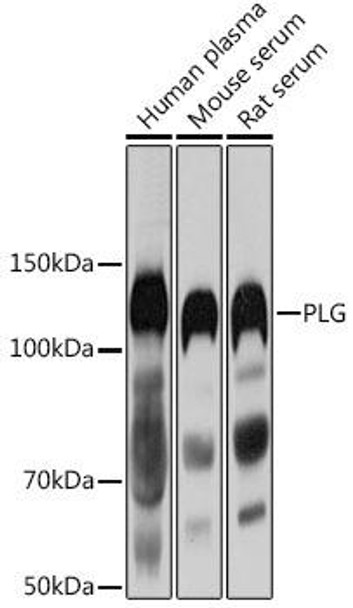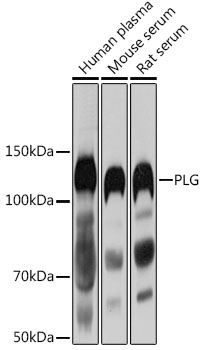PLG Antibody (CAB3320)
- SKU:
- CAB3320
- Product Type:
- Antibody
- Reactivity:
- Human
- Mouse
- Rat
- Host Species:
- Rabbit
- Isotype:
- IgG
- Research Area:
- Cardiovascular
Description
PLG Rabbit Polyclonal Antibody (CAB3320)
The Plasminogen Polyclonal Antibody (CAB3320) is a valuable tool for researchers studying plasminogen, a key protein involved in the regulation of blood clotting and tissue repair. This antibody, generated in rabbits, is highly specific for human samples and is suitable for use in Western blot applications.Plasminogen is a precursor to the enzyme plasmin, which plays a crucial role in breaking down blood clots and promoting tissue remodeling. Dysregulation of the plasminogen system has been implicated in various diseases, including thrombotic disorders and certain cancers. By targeting plasminogen with this antibody, researchers can gain insights into its expression levels and activity in different cell types, aiding in the investigation of its role in disease pathology.
With its high specificity and sensitivity, the Plasminogen Polyclonal Antibody (CAB3320) is a valuable tool for researchers interested in unraveling the complexities of the plasminogen system and its implications for human health. Its use in Western blotting applications allows for the detection and quantification of plasminogen in various experimental settings, making it an essential reagent for studies in vascular biology, hemostasis, and cancer research.
| Product Name: | PLG Rabbit Polyclonal Antibody |
| SKU: | CAB3320 |
| Size: | 20uL, 100uL |
| Isotype: | IgG |
| Host Species: | Rabbit |
| Reactivity: | Human,Mouse,Rat |
| Immunogen: | Recombinant fusion protein containing a sequence corresponding to amino acids 20-300 of human PLG (NP_000292.1). |
| Sequence: | EPLD DYVN TQGA SLFS VTKK QLGA GSIE ECAA KCEE DEEF TCRA FQYH SKEQ QCVI MAEN RKSS IIIR MRDV VLFE KKVY LSEC KTGN GKNY RGTM SKTK NGIT CQKW SSTS PHRP RFSP ATHP SEGL EENY CRNP DNDP QGPW CYTT DPEK RYDY CDIL ECEE ECMH CSGE NYDG KISK TMSG LECQ AWDS QSPH AHGY IPSK FPNK NLKK NYCR NPDR ELRP WCFT TDPN KRWE LCDI PRCT TPPP SSGP TYQC LKGT GENY RGNV AVTV SGHT CQHW S |
| Tested Applications: | WB ELISA |
| Recommended Dilution: | WB,1:500 - 1:2000 |
| Synonyms: | HAE4; PLG |
| Positive Sample: | Human plasma,Mouse serum,Rat serum |
| Conjugate: | Unconjugated |
| Cellular Localization: | Secreted. |
| Calculated MW: | 91kDa |
| Observed MW: | 125kDa |
The plasminogen protein encoded by this gene is a serine protease that circulates in blood plasma as an inactive zymogen and is converted to the active protease, plasmin, by several plasminogen activators such as tissue plasminogen activator (tPA), urokinase plasminogen activator (uPA), kallikrein, and factor XII (Hageman factor). The conversion of plasminogen to plasmin involves the cleavage of the peptide bond between Arg-561 and Val-562. Plasmin cleavage also releases the angiostatin protein which inhibits angiogenesis. Plasmin degrades many blood plasma proteins, including fibrin-containing blood clots. As a serine protease, plasmin cleaves many products in addition to fibrin such as fibronectin, thrombospondin, laminin, and von Willebrand factor. Plasmin is inactivated by proteins such as alpha-2-macroglobulin and alpha-2-antiplasmin in addition to inhibitors of the various plasminogen activators. Plasminogen also interacts with plasminogen receptors which results in the retention of plasmin on cell surfaces and in plasmin-induced cell signaling. The localization of plasminogen on cell surfaces plays a role in the degradation of extracellular matrices, cell migration, inflamation, wound healing, oncogenesis, metastasis, myogenesis, muscle regeneration, neurite outgrowth, and fibrinolysis. This protein may also play a role in acute respiratory distress syndrome (ARDS) which, in part, is caused by enhanced clot formation and the suppression of fibrinolysis. Compared to other mammals, the cluster of plasminogen-like genes to which this gene belongs has been rearranged in catarrhine primates.
| Purification Method: | Affinity purification |
| Gene ID: | 5340 |
| Storage Buffer: | Store at -20℃. Avoid freeze / thaw cycles.Buffer: PBS with 0.02% sodium azide,50% glycerol,pH7.3. |







